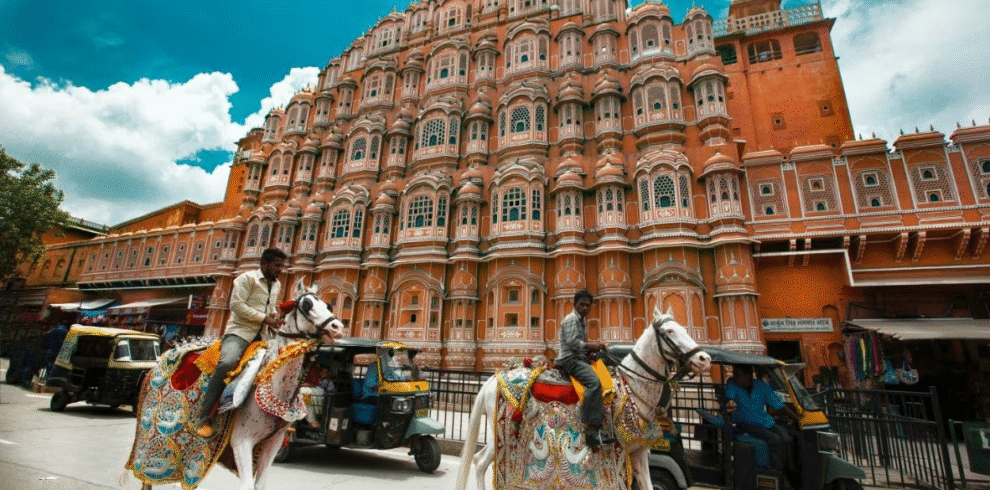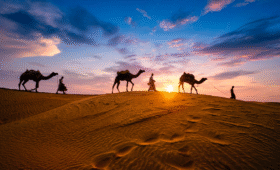Book Now!!

Your Spiti Valley tour Packages begins…
Nagaland Festival
Nestled in the enchanting landscapes of North-eastern India, Nagaland is not only celebrated for its breathtaking natural beauty but also revered for its vibrant tapestry of Nagaland festivals. Among these, the renowned Hornbill festival often takes center stage, captivating visitors with its rich history, cultural significance, and grand celebrations. However, Nagaland boasts a diverse array of festivals, each deeply ingrained in the state’s tradition, culture, and community life.
Home to sixteen to seventeen distinct tribal groups, Nagaland is predominantly a tribal state, where the essence of tradition and culture thrives. These Nagaland festivals are not just an occasion for revelry; they are a testament to the enduring heritage of Nagaland. They weave a colorful tapestry of history and tradition, celebrating the unity of various tribes and communities that call Nagaland home.
The Hornbill festival, undoubtedly the most famous of Nagaland festivals pays homage to the revered bird, the Great Indian Hornbill, which holds a special place in the Naga folklore. This week-long extravaganza in Kohima showcases the diverse tribal heritage of Nagaland, offering a window into the captivating world of Naga tribes through dance, music, and crafts. It’s an opportunity to witness the vibrant culture and traditions of Nagaland, uniting people from all corners of the state.
But beyond the Hornbill festival, Nagaland festivals boast a calendar filled with equally captivating celebrations. From the Aoling festival of the Konyaks, known for its mesmerizing dances, to the Moatsu festival of the Ao Naga tribe, celebrating the season of sowing, each festival paints a vivid picture of Nagaland’s cultural mosaic and uplifting the Nagaland festivals. These gatherings provide a unique opportunity for travellers to immerse themselves in the rich history and traditions of this remarkable state. So, if you are planning a trip to Nagaland, time your visit to coincide with one of these extraordinary festivals. You’ll not only witness grand celebrations but also gain a profound understanding of the deep-rooted cultural and historical significance that binds the people of Nagaland together.
8 best Nagaland festivals-
Hornbill festival-
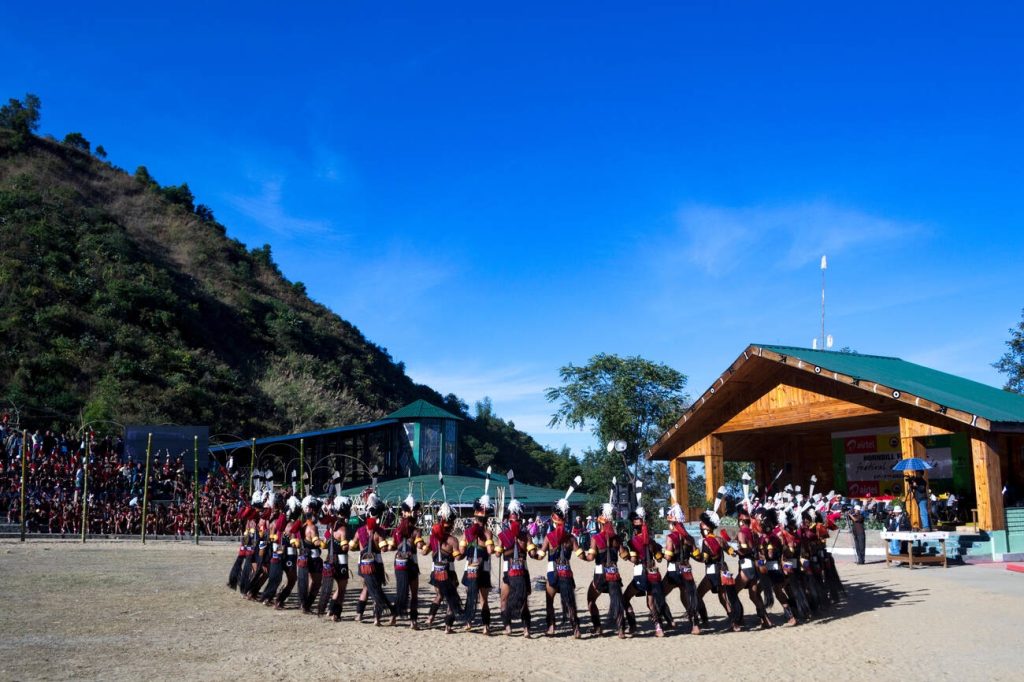
The Hornbill Festival, a dazzling showcase of Nagaland’s culture and heritage, is a must-visit event that takes place during the first week of December in Kisama village. Despite being a relatively recent addition to the Nagaland festivals calendar, having begun in the year 2000, it has quickly become one of the state’s most prominent celebrations. Its primary aim was to introduce Nagaland to tourists, a mission it has accomplished spectacularly, as it has drawn a significant increase in visitors.
This week-long extravaganza is not just a cultural exposition; it’s a vibrant spectacle of traditions, music, dance, and modern entertainment. The festival serves as a bridge between Nagaland’s ancient customs and contemporary aspirations. Visitors can immerse themselves in the rich tapestry of Naga culture through traditional dances, music performances, and handicraft displays.
One of the festival’s highlights is the chili-eating competition, a thrilling event that draws fearless participants and curious onlookers alike. Additionally, the festival features a captivating motor rally that showcases the adventurous spirit of Nagaland. The event is a true sensory delight, with the tantalizing aromas and flavors of Nagaland’s cuisine on full display. From exotic and unique dishes to delicious classics, the food at the Hornbill Festival is a culinary adventure in itself.
In essence, the Hornbill Festival is not just a celebration; it’s a cultural bridge, a platform for showcasing Nagaland’s diverse traditions and a testament to its warm hospitality. It has succeeded in its mission of putting Nagaland on the map, drawing visitors from around the world to experience the beauty, traditions, and vibrant energy of this incredible state.
Date: December 1 – December 10 2023 District: Kohi
Sekrenyi (Festival Of Nagaland) –
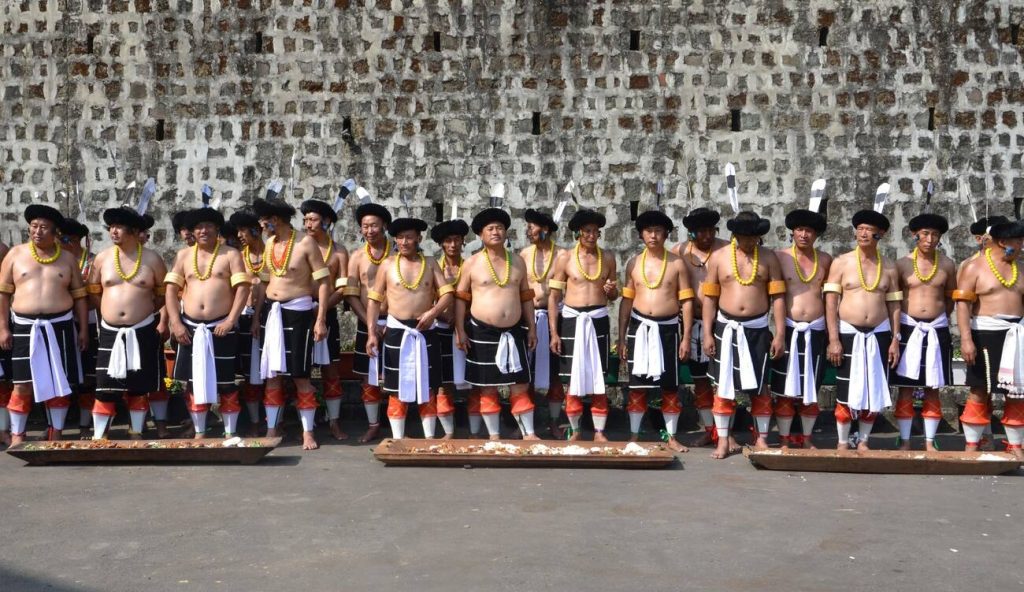
Sekrenyi, a cherished festival of the Angami tribe in Nagaland, offers a captivating glimpse into their rich cultural heritage. If you plan to experience this festival, February is the time to be in Nagaland. Sekrenyi is a transformative 10-day celebration, marked by an array of traditions, festivities, and communal harmony.
The festival commences with young bachelor men being granted the privilege to work on the first day. The subsequent day involves hunting animals for the main event. During the festival, the hunted animals are expertly cooked, resulting in a mouthwatering feast for all attendees. The meticulous slaughtering of chickens by men is followed by women skillfully preparing dishes using the freshly slaughtered poultry. What’s intriguing is the construction of specialized ovens solely for this purpose, only to be dismantled after the festival’s conclusion.
The fourth day holds particular significance for young couples in the community, as it provides an opportunity for them to exchange handmade gifts, symbolizing their love for each other. The latter part of the festival is a time for villagers to come together with their loved ones and relish their bonds.
As Sekrenyi draws to a close, the entire community gathers to share a communal meal, reinforcing the festival’s core purpose: promoting harmony and togetherness among the Angami tribe. This celebration is not just a festival; it’s a testament to the tribe’s unity, cultural richness, and their commitment to preserving their traditions for generations to come.
Date: February 25, 2023 District: Kohima
Tsukheneye-
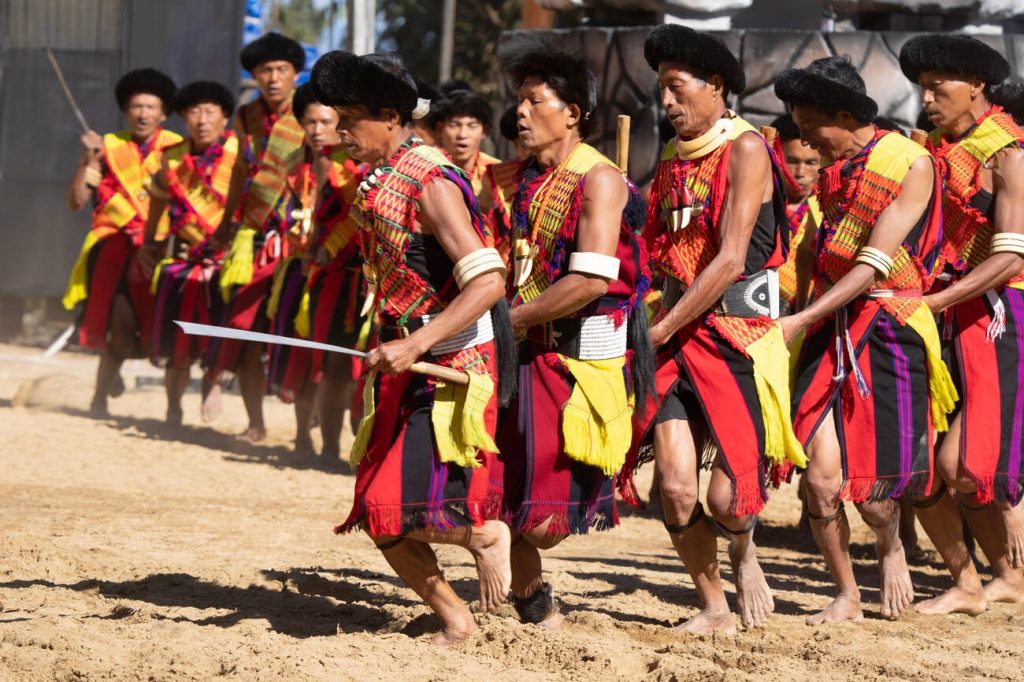
Tsukheneye, an integral festival in the Phek district of Nagaland, holds immense significance among the Chakhesang tribe, particularly for its connection to bountiful harvests. This unique celebration unfolds in the month of March and is a testament to the tribe’s agricultural roots.
The festival is a four-day spectacle filled with captivating traditions and rituals. It commences with the symbolic sacrifice of a rooster at dawn on the first day, signifying the tribe’s reverence for their crops. Following this ceremony, participants engage in ritualistic river bathing for purification, a practice exclusively reserved for men. The belief that these rituals directly influence the success of their upcoming harvests underscores the festival’s profound importance.
Tsukheneye’s distinctiveness lies in its exclusion of women from active participation. While women play vital roles in the Chakhesang tribe’s agrarian activities, this festival centers on the male members, emphasizing their responsibility for crop prosperity.
As the festival unfolds over its four days, it offers a captivating glimpse into the Chakhesang tribe’s traditions and beliefs, showcasing their unwavering connection to the land and their fervent desire for agricultural abundance. Tsukheneye is a remarkable celebration of culture, unity, and the timeless bond between the Chakhesang tribe and their agricultural heritage.
Date: The festival is held during the second week of March every year. District: Phek
Aoleang-
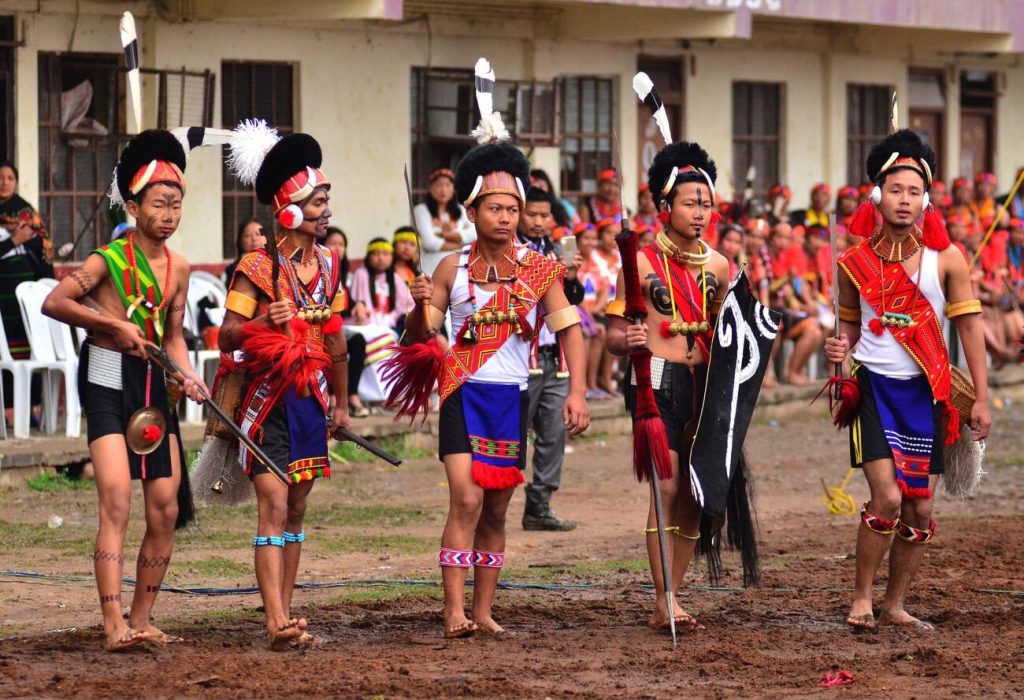
Aoleang a significant harvest festival in Nagaland, takes center stage among the Konyak tribe, offering a vibrant cultural experience. To immerse yourself in this celebration, plan a visit to Nagaland in April. Spanning approximately five days, Aoleang unfolds with a unique set of activities and rituals each day, making it a rich tapestry of traditions. This festival marks the culmination of the harvest season, celebrating the yield of new seeds in the tribal fields and heralding the arrival of the new year with the advent of spring. The festival’s depth and charm lie in the myriad customs and rituals that have been passed down through generations.
Aoleang is a sensory delight, featuring the mesmerizing song and dance routines of the tribal people of Nagaland. Each day of the festival brings new performances, with colorful attire and rhythmic dances that tell stories of the Konyak tribe’s history and way of life.
The government of Nagaland has played a pivotal role in promoting Aoleang, drawing visitors from around the world who seek to witness this cultural extravaganza firsthand. The festival is a testament to the Konyak tribe’s rich heritage and their unwavering commitment to preserving their traditions. Aoleang encapsulates the spirit of Nagaland, showcasing the state’s cultural diversity and providing a unique opportunity for visitors to engage with its vibrant tapestry of customs and celebrations.
Date: April 1 – April 2, 2023 District: Mon
Naknyulem-
Naknyulem, a vibrant festival celebrated by the Chang tribe, is a delightful ode to friendship, culture, and tradition. This joyous occasion, which takes place in July, is a spirited celebration filled with dance, music, and a multitude of exhilarating games.
At the heart of Naknyulem are spirited competitions that showcase the Chang tribe’s love for athleticism and camaraderie. Visitors can partake in or witness a variety of games, including Tug-of-war, Long jump, high jump, top-spinning, and even the amusing challenge of grabbing cooked pork with their mouths. Some peculiar and entertaining games are also part of the festivities, adding an element of surprise and laughter to the celebrations.
One unique aspect of Naknyulem is the enchanting sound of the ‘Kongkhim,’ a traditional Naga instrument played exclusively by women. This melodic addition adds depth and soul to the festival’s atmosphere.
Naknyulem is an opportunity to immerse oneself in the vibrant spirit of the Chang tribe, experience their rich traditions, and create lasting memories of fun and friendship. The festival is not only a joyful celebration but also a window into the cultural diversity that thrives in Nagaland, making it a truly unforgettable experience for all who attend.
Date: April 13, 2023 District: Tuensang
Minkut-
Minkut, a sacred festival celebrated by the Kuki tribe in Nagaland, is a unique religious observance that offers a fascinating glimpse into local customs and beliefs. To experience the solemnity and rituals of Minkut, one must plan a visit to Nagaland in the second week of January.
This religious festival is dedicated to appeasing the deity known as ‘Thilha.’ The elaborate rituals associated with Minkut are both intriguing and deeply rooted in the Kuki tribe’s belief system. One of the most notable practices is the ceremonial sacrifice of a fowl, carried out by the local people of Nagaland as an offering to appease Thilha.
The significance of January in the Kuki tribe’s calendar cannot be overstated, as it is known as the month of ‘Tolbol.’ During this time, it is believed that the demon Thilha visits the region, making the Minkut festival a crucial occasion for the Kuki tribe to pay homage to this deity and seek blessings for the year ahead.
Minkut serves as a unique testament to the religious and cultural diversity of Nagaland. While it may be less known compared to some other festivals in the state, it holds immense significance for the Kuki tribe and offers a distinctive opportunity for visitors to witness the blend of spirituality and tradition that defines this remarkable celebration.
Date: TBA District: Peren
Tokhu Emong-
Tokhu Emong, a tranquil and joyous festival, marks the conclusion of the harvest season for the Lotha tribe in Nagaland. This harmonious celebration takes place during the first week of November, offering a contrasting experience to the high-energy festivals in the state.
For the Lotha tribe, Tokhu Emong is a time of relaxation and camaraderie. It’s a time to revel in the fruits of their labor as they gather to sing, dance, and indulge in merrymaking. The festivities also include traditional drinks and a sumptuous feast, where the community comes together to share delicious meals.
The festival’s significance lies in commemorating a well-deserved “rest day” after the toil of the harvest season. With their agricultural work complete and the onset of winter, Tokhu Emong serves as a delightful interlude for the Lotha tribe to unwind and bond.
In contrast to the more high-profile festivals in Nagaland, Tokhu Emong offers a serene and authentic experience, allowing visitors to witness the Lotha tribe’s strong sense of community, appreciation for nature’s bounty, and their unique way of celebrating the changing seasons. It’s a reminder that not all celebrations need to be grand; sometimes, the simplest moments of togetherness hold the most profound meaning.
Date: TBA District: Wokha
Tuluni-
Tuluni, a heartwarming festival celebrated by the Sumi tribe in Nagaland, unfolds over three delightful days in the month of July. At its core, Tuluni is a celebration of unity and the nurturing of bonds among the Sumi people, with a special emphasis on welcoming young couples into the community.
To kick off this festival, locals exchange gifts as a symbol of goodwill and camaraderie. Families come together to prepare and share delicious meals, fostering a sense of togetherness and harmony within the community. The act of dining collectively strengthens the ties that bind them, emphasizing the importance of communal life.
Tuluni holds deep significance as it commemorates the fruitful harvest that sustains the Sumi tribe. It is not merely a time for revelry but also an opportunity to express gratitude for the bounty of crops bestowed upon them by the land.
While Tuluni may not be as widely recognized as some of Nagaland’s grander festivals, it stands as a testament to the Sumi tribe’s commitment to maintaining their cultural traditions and the importance they place on fostering unity and harmony among their people. It is a celebration of simplicity, shared meals, and the enduring bonds that make the Sumi tribe a close-knit community.
Date: First week of July. District: Zunheboto
In the diverse tapestry of Nagaland’s festivals, each celebration, whether grand or intimate, represents a profound connection to culture, tradition, and community. From the vibrant rhythms of the Hornbill Festival to the serene moments of Tuluni, these festivals illuminate the rich heritage and enduring spirit of Nagaland. Through dance, song, ritual, and camaraderie, the people of Nagaland continue to celebrate their history and nurture their bonds, inviting visitors to share in the joyous tapestry of their lives. Nagaland’s festivals are not just events; they are timeless expressions of identity and unity.
FAQs
-
What are the names of Naga festivals?
Naga festivals encompass a wide range of celebrations, with the prominent “Hornbill Festival” being one of the most renowned.
-
How many festivals are celebrated in Nagaland?
Nagaland boasts a multitude of festivals, with various tribes holding their unique celebrations. The exact number of festivals is extensive, as different communities observe their own traditions.
-
Who celebrates the Biju festival?
The Biju festival is primarily celebrated by the Chakhesang tribe in Nagaland.
-
How is Kandali festival celebrated?
There is limited information available about the Kandali festival, and it may be a localized or lesser-known celebration within a specific community or region in Nagaland.

